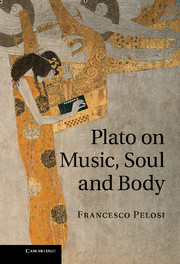Introduction
Published online by Cambridge University Press: 05 November 2014
Summary
MUSIC AND PHILOSOPHY
In the Phaedo (60d–61b), Socrates confesses that throughout his life he had interpreted the oneiric warning: ‘practise and compose music’ (mousikēn poiei kai ergazou) as an invitation to practise the ‘greatest music’ (megistē mousikē) that is philosophy. Now, however, close to death, he decides to consider the words from his dream in a different light. Not without a certain unease, he engages in ‘popular music’ (dēmōdēs mousikē), which concerns poetry and myth, rather than philosophy and ‘arguments’ (logoi). So it is that the Phaedo opens with two entirely different meanings of music: music in the commonly accepted sense and music that, in the very uncommon sense, is identified with philosophy.
For anyone embarking on a discussion of music, soul and body in Plato, the dream scene gives some indication of what such an analysis involves. In the first place is the need to take on board, as far as possible, the meanings and value of a music that is no longer ‘popular’; in the second place, the need to find characteristics that are still less clear, of the highest form of music that is assimilated to philosophy. With these two tasks – finding the significance of mousikē, and the significance of mousikē that has undergone Platonic investigation – we get to the heart of the analysis that Plato dedicates to the musical phenomenon and its relationship with philosophy.
- Type
- Chapter
- Information
- Plato on Music, Soul and Body , pp. 1 - 13Publisher: Cambridge University PressPrint publication year: 2010



